King Lear Themes
Theme is a pervasive idea presented in a literary piece. King Lear , a masterpiece of William Shakespeare , has very thoughtful themes. It presents the dilemma of human relations and exposes the dark sides of human nature, such as infidelity and ungratefulness. Some of the major themes in King Lear have been discussed below.

Themes in King Lear
Age and the process of aging is a significant theme of the play , King Lear. When a person starts aging, he starts losing his significance. As King Lear starts aging, he starts making decisions about his kingdom and makes a bet on the persons expressing their profound love for them. However, old King Lear does not understand Cordelia is the loyal one. Sadly, he trusts the deceitful ones. On the other hand, Edmund also waits for his father, Gloucester, to die so that he could inherit something to win social legitimacy in the eyes of the social fabric he wants to live in. In fact, King Lear’s age heralds a new social circle forming around him where he is not the kingpin, but just a commoner having no authority as in the past. However, he wants to retain the same authority even in his old age, that seems impossible. That is why he admits of his being old and the desire for retirement without having to abandon his privileges. Therefore, old age and its attendant features of losing privileges.
Family Relations
Family relationships and family loyalty are equally prominent as King Lear checks the loyalty of his daughters through their love. Though superficially, love is in abundance, it becomes scary when it comes to its application and demonstration. Cordelia, however, shows true loyalty to her father by staying with him until the end when Goneril and Regan conspire to keep the old man out of their castles. Despite severe emotional consequences and legal and regal repercussions, Goneril and Regan do not budge from their stand of keeping the king out. Similarly, Gloucester’s act of fathering Edmund seems a matter of childishness for him and causes sufferings for all others. King Lear’s earlier act of seeing familial love through expressions of love seems to hinge upon the fact that he wants to ensure family loyalty and blindly trusts the one who vocally vows to love him but abandon him later.
Madness and ensuing foolishness is another major theme of the play, King Lear. However, most of the characters , including that of the king, try to determine their reasonable behavior toward the choice they have to make. However, most often, they fail to think clearly. It is because most of them, including the King himself, try to keep their own interests before them, ignoring the interests of others. That is why he puts the entire kingdom in harm’s way with the desire for power come what may . His irrational desire to hear only love and nothing else and then irrational decision to cling to power even after dividing his kingdom seems a foolish decision, bordering madness. That is why the court jester, mostly known as fool, appears to help King Lear realize the situation prevalent in his kingdom. He makes the king realizes his own madness about judging people.
Significance of Order
Order and its significance in the world is another major theme of the play, King Lear. It is clear from the very start that King Lear is disrupting this order. He brings chaos in his family and his country. His desire for seeming love, even if it is flattery, makes him reject those who want to bring order and calmness. He almost disowns Cordelia for her honesty and divides his kingdom among two undeserving daughters. This brings chaos on which the court jester makes a commentary. Interestingly, even the jester taunts him for throwing away his kingdom. In fact, where Cordelia and Kent bring order and strength, Edmund, Edgar, Goneril, and Regan are the forces who bring disorder and disruption. Even King Lear himself wants disruption as he finally curses his treacherous daughter.
King Lear tests the loyalty of his daughters and their husbands through a test. He asks them to tell him how much they love him. Regan and Goneril instantly shower praises on him, vowing their everlasting and strong love, while Cordelia, who actually takes care of him and loves him very much, only states that she loves him. The king was enamored of this superficial realization of the love of his daughters that he instantly considers both of them worthy of the heritage to share his kingdom. However, he does not take care of Cordelia. Instead, he instantly disinherits her. Despite this treatment, she stays loyal to her father, demonstrating that the relationships of father-daughter are not subject to property and divisions; rather, it is an enduring bond of loyalty.
The theme of justice is intertwined with the theme of royal authority. King Lear does injustice to his daughter, Cordelia, who, despite her intense love for her father, is thrown away, while Regan and Goneril’s deception is bought by King Lear. He, however, faces injustice at the hands of both of his daughters so much so that he is left in the stormy weather to bear the brunt of his own doing. Later, he repents over this injustice meted out to him, saying that he has faced punishment more than his sin. However, later he seeks justice through a mock trial. Another point of injustice is to Edmund committed by Gloucester that he is illegitimate, which makes him jealous of his brother for which he plans his brother’s exile and murder Cordelia. The punishment meted out to him by the end is another instance of justice.
Appearance and Reality
Appearance and reality is another important theme of the play. Lear believes in the false narrative of his daughters, Goneril and Regan, that they love her more than he can think. However, he equally turns away his attention from the reality that his daughter, Cordelia, loves him the most. The appearances of his two elder daughters fool him, and he ignores his daughter, who shows him true love and loyalty. Similarly, Edmond, the illegitimate son of Gloucester, does not accept this reality and conspires to discredit his brother, Edgar, the legitimate son.
Compassion and humanity is another thematic strand that runs parallel to other themes. Although King Lear sends Kent into exile, he still comes back to serve him as a farmer. He knows that the king has done a wrong and would soon face repercussions. So, when the king sees the jester, he feels sympathy and compassion for him. The king also tears down his clothes to show his sympathy for poor Tom when he sees such poor people facing problems in life.
Nature and its impacts, like the storm in the play, shows that the kingdom of King Lear is in turmoil on account of his own actions. The turns in weather conditions also reflect how King Lear faces mental instability that leads to his confusion and madness. This is actually, as stated by King Lear himself, a tempest in his mind reflected through nature.
Vision is a minor yet important theme of the play, which is evident in many ways. Sometimes in literally and sometimes symbolically. King Lear’s call to his daughters to demonstrate their love is a loss of his vision that cost him his kingdom.
Related posts:
- King Lear Characters
- King Lear Quotes
- The Tempest Themes
- Twelfth Night Themes
- Macbeth Themes
- Hamlet Themes
- 1984 Themes
- The Crucible Themes
- Frankenstein Themes
- Oedipus Rex Themes
- The Metamorphosis Themes
- Beowulf Themes
- Odyssey Themes
- Beloved Themes
- Slaughterhouse-Five Themes
- Antigone Themes
- Inferno Themes
- Fahrenheit 451 Themes
- Into the Wild Themes
- The Alchemist Themes
- Night Themes
- Life of Pi Themes
- The Invisible Man Themes
- The Iliad Themes
- The Jungle Themes
- Siddhartha Themes
- The Stranger Themes
- The Aeneid Themes
- Dracula Themes
- To Kill a Mockingbird Themes
- The Scarlet Letter Themes
- The Canterbury Tales Themes
- Heart of Darkness Themes
- Brave New World Themes
- Death of a Salesman Themes
- Things Fall Apart Themes
- A Tale of Two Cities Themes
- A Doll’s House Themes
- The Grapes of Wrath Themes
- Crime and Punishment Themes
- Their Eyes Were Watching God Themes
- Wuthering Heights Themes
- In Cold Blood Themes
- The Kite Runner Themes
- The Glass Castle Themes
- Julius Caesar Themes
- The Adventures of Huckleberry Finn Themes
- Oedipus The King
- King Archetype
- Literary Writing Style of Stephen King
- Romeo and Juliet Themes
- Lord of the Flies Themes
- Jane Eyre Themes
- 10 Different Themes in Taylor Swift Songs
- A Huge List of Common Themes
- Examples of Themes in Popular Songs
- That Way Madness Lies
- To Kill a Mockingbird Racism
- Song of the Witches: Double, Double Toil and Trouble
- Twelfth Night Quotes
- Twelfth Night Characters
- William Shakespeare
- The Tempest Quotes
- The Tempest Characters
- Blow, Blow, Thou Winter Wind
- Sonnet 55: Not Marble nor the Gilded Monuments
- Twelfth Night
- Julius Caesar Quotes
- Speech: “Is this a dagger which I see before me
- A Midsummer Night’s Dream
- The Taming of the Shrew
- Shall I compare thee to a summer’s day?
- Sonnet 11: As Fast As Thou Shalt Wane, So Fast Thou Grow’st
- Sonnet 12: When I Do Count The Clock That Tells The Time
- Sonnet 14: Not From The Stars Do I My Judgement Pluck
- Sonnet 15: When I Consider Everything That Grows
- Sonnet 10: For shame deny that thou bear’st love to any
- Sonnet 16: But Wherefore Do Not You a Mightier Way
- Sonnet 17: Who Will Believe My Verse in Time to Come
Post navigation

Basically, Lear wishes them to inform him how much intense they love him to decide who gets the most land. Goneril and Regan, looking a massive piece of the dominion, say these kinds of fine things to flatter Lear.
But Cordelia, the youngest daughter, just says she loves him like a daughter should; she might not faux for land. This makes Lear angry, and he disowns Cordelia, thinking she’s ungrateful.
Act 2: The Unraveling of Betrayal
After giving up the kingdom, Lear sees that Goneril and Regan are not without a doubt excellent daughters. They remove his strength, treat him badly, and don’t care approximately him at all.
Meanwhile, there may be trouble brewing with some other own family: Gloucester and his sons, Edgar and Edmund. Edmund, trying strength, tricks his father into thinking Edgar is a horrific guy, inflicting a rift between them.
Act 3: Themes of Madness and Descent
In Act 3 of King Lear By William Shakespeare , Matters get intense for Lear. He’s out in a fierce thunder, feeling completely lost and torn aside. This thunder isn’t always just a ordinary thunder; it is a mirrored image of Lear’s inner uncertainty.
Additionally, his mind is in chaos, mirroring the chaos of the storm. While this takes place, Gloucester, every other individual, is going through a extraordinary sort of thunder.
He’s tricked and blinded by using people he trusts, and this blinding is extra than simply bodily; it’s a symbol of ways he can not see the reality anymore due to the evil deeds round him.
Furthermore, these both Lear and Gloucester’s struggling highlights the deeper topics of ethical confusion and the breakdown of order in society.
Act 4: Character Evolution and Conflict
Act 4 Act four sees some main shifts in the characters. Lear turns into more open and sensitive. He’s no longer the powerful king he as soon as changed into, and this alteration makes him more human and relatable.
In addition, Cordelia returns, showing her unwavering love and loyalty in the direction of her father. She’s the only one that simply cares about him despite the whole lot that has occurred. Meanwhile, the battle among Edgar and Edmund, the 2 brothers, intensifies.
Furthermore, Edgar disguises himself to cover from Edmund’s evil plans, main to their inevitable war of words. Their battle reflects the broader subject of moral and ethical picks amidst chaos and adversity.
Act 5: Tragic Resolution and Conclusion
Act five of King Lear By William Shakespeare, brings the tale to a sad give up. Cordelia, who got here again to help her father, gets captured and dies, which breaks Lear’s coronary heart. Lear sooner or later understands Cordelia’s deep love for him, but it is too past due.
In addition, his recognition comes in a heartbreaking second, adding to the tragedy. Lear dies too, ate up via sorrow. The play concludes on a sorrowful word, leaving all and sundry feeling deeply saddened and reflecting on the results in their movements.
In Act 1, King Lear’s division of the land represents the themes of energy, love, and the frailty of human relationships. Lear’s call for for flattery exposes his vulnerability and preference for validation, reflecting the societal expectancies of loyalty.
In addition, Cordelia’s refusal to comply highlights her integrity, however also signifies the dangers of speaking truth to power. This act symbolizes the inevitable struggle between truth and deceit, placing the degree for the tragic events that observant.
In Act 2 of King Lear By William Shakespeare, Goneril and Regan’s betrayal of Lear indicates the corrupting have an effect on of strength and the erosion of familial bonds. Their mistreatment in their father reflect a starvation for manage, symbolizing the risks of unchecked ambition.
Meanwhile, Edmund’s scheming towards Edgar unveils the depths of ethical ambiguity, portraying the complexities of human nature and the inherent battle between legitimacy and manipulation inside the pursuit of strength.
Moreover, this act exposes the deceptive nature of appearances and challenges the audience’s perceptions of loyalty and fact.
Act 3 deals with the psychological descent of characters, specifically Lear and Gloucester. The thunder will become a metaphor for the inner uncertainty and chaos within Lear’s thoughts, reflecting his shattered reality and emotional uncertainty.
Gloucester’s literal blinding by way of Regan and Cornwall symbolizes the pervasive ethical blindness and the effects of being deceived by using fake allegiances. This act invites reflection at the fragility of sanity amidst a global fed on through deceit and ethical decay.
In Act 4, Lear’s transformation from a as soon as-proud king to a broken, introspective guy shows the power of humility and self-consciousness. Cordelia’s go back embodies the subject matters of forgiveness and compassion, supplying a glimpse of desire amidst the tragedy.
The escalating war between Edgar and Edmund displays the struggle between honor and treachery, illustrating the moral dilemmas confronted by means of people navigating a morally compromised international.
Furthermore, this act explores the complexities of human nature and the internal battles between virtue and self-interest.
As Act 5 reaches its tragic conclusion, Cordelia’s demise will become a catalyst for Lear’s final moments of readability and self-attention. Lear’s popularity of Cordelia’s unwavering love underscores the price of his misjudgments and the real value of proper affection.
Moreover, his tragic loss of life serves as a reminder of the cyclical nature of electricity and the inevitability of fate, bringing the play to a somber and contemplative close. The play’s end prompts audiences to grapple with the complexities of human frailty and the enduring results of pleasure and betrayal.
In addition, this evaluation offers a deeper exploration of the thematic elements, character trends, and symbolic representations found in acts of King Lear By William Shakespeare, emphasizing the play’s profound examination of human nature, power dynamics, and the tragic results of unsuitable selections.
05 Famous Quotes In King Lear
Here are five quotes from William Shakespeare’s play “King Lear” with references:
- Act 1, Scene 1, Line 92
- Act 1, Scene 4, Lines 312-313
- Act 3, Scene 2, Lines 73-74
- Act 4, Scene 1, Lines 36-37
- Act 4, Scene 1, Lines 27-28
Characters:
King Lear, an growing old monarch, is a complicated character who represents pleasure. Initially, he seeks validation via his daughters’ declarations of affection, displaying his vanity and preference for strength.
In addition, his rash decisions and lack of ability to differentiate among real love and flattery cause tragic effects. Lear’s journey from a once-effective king to a damaged, remorseful man showcases the topics of satisfaction, madness, and the fee of misjudgment.
Cordelia, Lear’s youngest daughter, embodies honesty and integrity. She refuses to engage in exaggerated flattery to win her father’s desire, which leads to her disinheritance. Despite being mistreated, Cordelia’s hidden love for her father stays constant.
Her go back to useful resource Lear highlights her compassion and forgiveness, serving as a symbol of authentic love amidst the deceit and betrayal ordinary within the play.
Edmund, Gloucester’s illegitimate son, represents ambition. He schemes in opposition to his legitimate brother, Edgar, manipulating occasions to advance his very own interests.
Furthermore, Edmund’s actions replicate the play’s exploration of moral ambiguity and the desire for energy. His manipulation and deceit make contributions to the turmoil inside Gloucester’s own family, adding complexity to the issues of betrayal and moral decay.
Gloucester, a nobleman and father to Edgar and illegitimate son Edmund, symbolizes the consequences of moral blindness. He falls victim to Edmund’s deceit, ensuing in his literal blinding by using Regan and Cornwall.
Additionally, Gloucester’s adventure represents the play’s exploration of accept as true with, deception, and the battle to understand fact amidst a international packed with duplicity.
Regan and Goneril
Regan and Goneril, Lear’s older daughters, encompass deceit and greed. Their false declarations of affection to advantage electricity monitor their manipulative nature and absence of proper affection for their father.
Their mistreatment of Lear symbolizes the topics of betrayal and the corrupting affect of energy, contributing to the tragic activities that spread inside the play.
Moreover, these person descriptions provide insights into the personalities and roles of some key figures in “King Lear,” showcasing their motivations, virtues, and flaws in the context of the play’s overarching issues of power, betrayal, and the complexities of human nature.
Power and Authority:
The subject of power in “King Lear” extends past kingship; it deals with the abuse and complexities of authority. Lear’s selection to divide his state initiates a electricity war amongst his daughters, revealing how energy can corrupt and manage familial relationships.
The subsequent chaos exposes the vulnerability of absolute authority, highlighting the fragility of manage in a international in which betrayal and deception thrive.
Betrayal and Deception:
The subject of betrayal is multifaceted, demonstrating the unfavourable nature of deception inside relationships. Lear’s daughters, Goneril and Regan, lie to him, showcasing how familial agree with may be exploited for personal advantage.
Furthermore, this betrayal expands beyond the own family, intertwining with Edmund’s deceit towards Gloucester and Edgar. It underscores the pervasive nature of treachery and the devastating outcomes it inflicts on believe and loyalty.
Madness and Sanity:
The subject matter of madness serves as a mirrored image of the characters’ internal turmoil amid external chaos. Lear’s descent into insanity parallels the turmoil in the country.
It underscores the fragility of the human thoughts beneath big emotional strain, thinking the limits between sanity and insanity, and the way intellectual soreness parallels societal breakdown.
Justice and Injustice:
The topic of justice explores the idea of cosmic justice as opposed to human injustice. The play portrays a global where ethical rectitude does not assure a truthful outcome.
Furthermore, the good characters like Cordelia go through unjustly, whilst deceitful ones like Goneril and Regan seem to thrive. This theme activates mirrored image on the ethical order of the universe and the cruel realities of lifestyles’ injustices.
Filial Relationships:
The theme of family dynamics examines the complexities of parental love and filial duties. Lear’s misjudgment of his daughters’ affections famous the vulnerability and fragility of familial bonds.
In addition, Cordelia’s steadfast love for her father in adversity contrasts with the betrayal of her sisters, highlighting the importance of proper love and loyalty within familial relationships.
Nature and the Natural Order:
Nature inside the play displays the ethical disease in the characters and the kingdom. The typhoon, symbolic of internal turmoil, mirrors the societal chaos caused by the characters’ movements.
The disruption in the natural order serves as a metaphor for the imbalance inside the ethical material of society.
Redemption and Forgiveness:
The subject matter of redemption emerges thru acts of compassion and forgiveness despite the tragic events. Furthermore, Cordelia’s forgiveness of Lear and Edgar’s forgiveness of his deceived father illustrate the capability for restoration and redemption amidst suffering, emphasizing the iconic energy of forgiveness inside the face of betrayal and ache.
Blindness and Insight:
Symbolic blindness, whether literal or metaphorical, reflects the characters’ lack of insight into the truth. Additionally, Lear’s blindness to Cordelia’s real love and Gloucester’s literal blindness symbolize the characters’ inability to peer truth amidst deception.
Basically, this subject emphasizes the outcomes of ethical blindness, delight, and the distortion of fact.
Additionally, these issues interweave at some point of King Lear By William Shakespeare, imparting profound insights into human nature, morality, and the complex complexities of relationships, contributing to the play’s intensity and enduring relevance.
Leave a Comment Cancel reply
Save my name, email, and website in this browser for the next time I comment.

The Jewelry Guy De Maupassant | Summary, Character & Analysis

Non-congruent alternate interior angles & Alternate

Murder vs Manslaughter vs Homicide | Differences & Comparative Analysis

Intrafamily Transfer & Dissolution | Benefits & Example
Philosophy of discipline | classroom discipline & it’s types, mary anne bell in the things they carried | analysis & quotes.

27 Species Of Diving Ducks In Michigan
Restraining order vs protective order | definition, differences & types.

Receivable Management | Objectives, Importance, Strategies & Scope

Eye Of Horus vs Eye Of Ra | Background, Similarities & Differences

Story Arcadia
King Lear Themes: Power, Madness, Family, and Justice Explored
“King Lear,” one of William Shakespeare’s most profound tragedies, delves deep into the human condition through its intricate narrative and multifaceted characters. At the heart of this dark and powerful play are themes that resonate with audiences centuries after it was first performed. Understanding these themes is crucial to grasping the full complexity of the story and the motivations driving its characters.
The play’s exploration of power and madness, family dynamics, and justice not only shapes the unfolding drama but also offers a mirror to our own societal structures and personal relationships. As we delve into these central motifs, we uncover how King Lear’s fateful decision to divide his kingdom among his daughters triggers a cascade of chaos and betrayal, while madness—both feigned and genuine—reveals deeper truths about the characters’ psyches.
Family ties are tested as loyalty comes into question, particularly in the strained relationships between Lear and his daughters, as well as between Gloucester and his sons. Meanwhile, the theme of justice—or often its absence—underscores the play’s events, highlighting its arbitrary nature in a world rife with moral ambiguity.
In examining these themes, we gain insight into why “King Lear” remains a timeless tragedy that continues to captivate audiences with its emotional depth and commentary on human nature. Through Shakespeare’s masterful thematic exploration, we are invited to reflect on our own lives and societies. Power and Madness in King Lear
In William Shakespeare’s “King Lear,” the quest for power and the descent into madness are central themes that drive the narrative forward. The play opens with King Lear’s fateful decision to divide his kingdom among his daughters based on their flattery, a choice that ultimately leads to his downfall and the unraveling of order within the realm.
The theme of power is evident as Lear’s authority is challenged and diminished. His abdication of responsibility sets off a chain reaction of chaos and betrayal. As Lear relinquishes his crown, he expects to retain his kingly dignity, but instead, he finds himself stripped of power and respect. This loss becomes a catalyst for conflict as his daughters Goneril and Regan vie for control, revealing their true, ruthless natures.
Madness is another key theme that intertwines with power. Lear’s descent into insanity is both a literal and metaphorical reflection of the kingdom’s disintegration. As he grapples with the consequences of his actions and the treachery of those he trusted most, Lear’s mind begins to fracture. His madness is not only a personal tragedy but also serves as commentary on the folly of relinquishing control without foresight.
The play also explores feigned madness through the character of Edgar, who disguises himself as Poor Tom to escape persecution. Edgar’s pretense contrasts with Lear’s genuine madness, highlighting how sanity can be feigned or lost in response to overwhelming circumstances.
Through these examples, Shakespeare delves into the complex relationship between power and sanity, showing how quickly stability can turn into turmoil when authority is misused or misunderstood. The themes of power and madness in “King Lear” serve as a stark reminder of the fragility of human reason and social order when faced with ambition and deceit. Family Ties and the Quest for Justice in King Lear
In “King Lear,” the bonds of family are tested and torn asunder, revealing the complexities of loyalty and betrayal. Lear’s relationship with his daughters Regan, Goneril, and Cordelia serves as a stark portrayal of how familial love can be manipulated and weaponized. Lear’s misguided decision to judge his daughters’ affection based on flattery leads to his downfall. Cordelia’s refusal to partake in her sisters’ deceitful exaggerations of love results in her disinheritance, setting off a chain of events that exposes the fragility of family ties.
Similarly, the subplot involving the Earl of Gloucester and his sons Edgar and Edmund echoes this theme. Gloucester’s trust in his illegitimate son Edmund over Edgar demonstrates how easily family loyalty can be subverted by lies and ambition. Edmund’s treachery not only endangers his brother but also contributes to the larger theme of justice within the play.
Justice—or rather its absence—is a central concern in “King Lear.” The characters who commit acts of betrayal and cruelty often seem to escape punishment, while those who remain virtuous suffer. This apparent injustice is epitomized in the play’s tragic conclusion, where characters like Cordelia meet untimely deaths despite their integrity. The randomness with which suffering is meted out suggests that justice within the world of “King Lear” is as unstable as a kingdom divided by a king’s whim.
Through these intertwined themes of family dynamics and justice, Shakespeare invites us to ponder whether true justice can ever be achieved in a world rife with corruption and broken familial bonds. The harsh treatment of characters like Cordelia and Edgar reveals a grim perspective on the fairness of life’s outcomes, yet it also emphasizes the importance of maintaining one’s moral compass amidst chaos.
In sum, “King Lear” delves deep into the heartache wrought by fractured families and the elusive nature of justice. These themes underscore not only the personal tragedies experienced by the characters but also resonate with timeless questions about human relationships and societal equity. Understanding the Heart of Tragedy in King Lear
In conclusion, “King Lear” remains a timeless masterpiece, not only for its dramatic narrative but also for the profound themes it explores. The play’s examination of power and authority reveals the chaos that ensues when leadership is misguided or relinquished. Lear’s descent into madness, mirrored by Edgar’s feigned insanity, underscores the thin line between reason and lunacy when faced with overwhelming betrayal and loss.
Family dynamics are at the core of this tragedy, with Lear’s relationship with his daughters and Gloucester’s with his sons serving as cautionary tales about trust, love, and loyalty. Moreover, the theme of justice—or often its absence—highlights the unpredictable and sometimes cruel nature of both human decisions and fate.
These themes contribute significantly to “King Lear”‘s emotional depth and its enduring relevance. Through Shakespeare’s exploration of power, madness, family ties, and justice, we gain valuable insights into human nature and societal structures that continue to resonate today. The tragedy invites us to reflect on our own lives and communities, reminding us of the complexities and vulnerabilities inherent in our existence.
Related Pages:
- Themes in "King Lear": Power, Betrayal, Madness,…
- Exploring the Power of Drama: Historical and…
- Motif in Macbeth: Unveiling Shakespeare's Thematic Tapestry
- Motifs in Macbeth: Unveiling Themes and Character Arcs
- Themes in 'The Tempest': Unveiling Shakespeare's…
- Motif Literary Device: Unveiling Depth in Literature
Leave a Comment Cancel reply
Save my name, email, and website in this browser for the next time I comment.
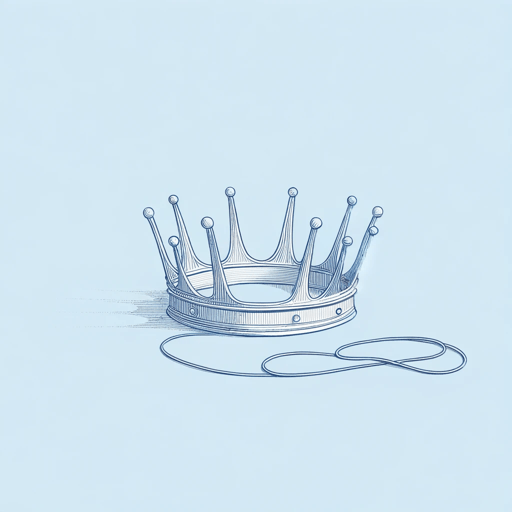
74 pages • 2 hours read
A modern alternative to SparkNotes and CliffsNotes, SuperSummary offers high-quality Study Guides with detailed chapter summaries and analysis of major themes, characters, and more. For select classroom titles, we also provide Teaching Guides with discussion and quiz questions to prompt student engagement.
Acts Summaries & Analyses
Character Analysis
Symbols & Motifs
Important Quotes
Essay Topics
Discussion Questions
How Madness Reveals Truth
The lunatics of King Lear —pretended and actual—are forever in closer contact with reality than the seemingly sane. This is evident in the Fool , whose job is to veil the harsh truth in the garb of nonsense riddles and bawdy songs. The same is true of Edgar , who capers naked in his shocking disguise as Poor Tom, and Lear himself. The play’s madmen, either implicitly or explicitly, reveal one of the play’s central truths: Every human is, at root, a frail and fallible mortal.

Don't Miss Out!
Access Study Guide Now
Related Titles
By William Shakespeare

All's Well That Ends Well
William Shakespeare

A Midsummer Night's Dream

Antony and Cleopatra

As You Like It

Henry IV, Part 1

Henry IV, Part 2
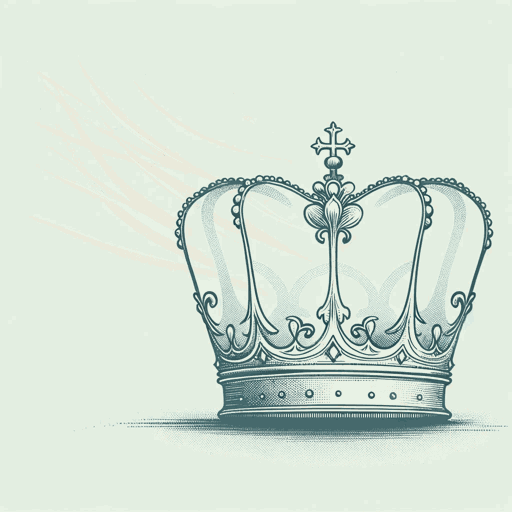
Henry VI, Part 1
Henry VI, Part 3

Julius Caesar

Love's Labour's Lost

Measure For Measure

Much Ado About Nothing

Featured Collections
Elizabethan Era
View Collection
Shakespeare
Truth & Lies
King Lear: Themes
- Justice: This theme explores the imbalance of fairness in the kingdom and the moral rightness of the characters’ actions; it questions whether justice exists in the universe.
- Compassion: The theme of compassion is primarily manifested in the characters who display kindness and empathy in response to the suffering of others despite their own troubles.
- Appearance vs Reality: This theme draws attention to the discrepancy between how characters appear on the surface and their true inner selves or intentions, particularly in the ruthlessness of Goneril and Regan, and the virtue of the ‘mad’ Lear and ‘foolish’ Fool.
- Nature: The theme of nature signifies the characters’ primitive, animalistic instincts and their relationship with the natural world, often highlighting the brutality and chaos in human nature.
- Blindness vs Sight: This theme explores the concept of understanding and insight versus ignorance and inability to perceive the truth, both physically (Gloucester’s blinding) and metaphorically (Lear’s folly).
- Madness: This theme addresses the descent into insanity of King Lear, questioning sanity and reason, and demonstrating how this serves as a mirror to the chaos in the kingdom.
- Family: The theme of family presents the dynamics and conflicts within the royal family and the consequences of broken familial bonds, emphasising themes of loyalty, betrayal, and power struggles.
- Gender: This theme criticises patriarchal rule by exploring the destructive power and deceit of King Lear’s daughters, offering a critique of traditional gender norms and highlighting the need for balance and respect in gender relationships.
'King Lear' Themes
Natural vs. culture: family roles, nature vs. culture: hierarchy, language, action, and legitimacy.
- Master of Studies, University of Oxford
- Bachelor of Arts, Brown University
The themes of King Lear are enduring and familiar even today. The master of language that he was, Shakespeare presents a play whose themes are seamlessly interwoven and difficult to separate.
This is an important theme in the play, as it brings about much of its action from the very first scene and connects to other central themes like language versus action, legitimacy, and perception. Edmund, for example, asserts that his status as illegitimate son is only a product of unnatural social constructs. He even goes so far as to suggest that he is more legitimate than his brother Edgar because he was born in a passionate—although dishonest—relationship, the product of two humans following their natural drives.
At the same time, however, Edmund disobeys the supposedly natural drive of a son loving his father, behaving so unnaturally as to plan to kill his father and brother. In the same “unnatural” way, Regan and Goneril plot against their father and sister, and Goneril even schemes against her husband. Thus, the play demonstrates a preoccupation with familial connections and their relationship to the natural versus the social.
Lear grapples with the theme of nature versus culture in a very different way, evidenced in what has become the legendary scene on the heath. The scene is rich in interpretations, as the image of the helpless Lear in the midst of a colossal storm is a powerful one. On one hand, the storm on the heath clearly reflects the storm in Lear’s mind. Just as he cries out, "Let not women’s weapons, water-drops, stain my man’s cheeks!" (Act 2, scene 4), Lear connects his own teardrops with the storm’s raindrops through the ambiguity of “water-drops.” In this way, the scene implies that man and nature are much more in tune than suggested by the unnatural cruelty of the family members depicted here.
At the same time, however, Lear attempts to establish a hierarchy over nature and thereby separate himself. Accustomed to his role as king, he demands, for example: "Blow, wind, and crack your cheeks!” (Act 3, Scene 2). While the wind does blow, it is obvious it does not do so because Lear has demanded it; instead, it seems like Lear is fruitlessly attempting to order the storm to do what it had already decided to do. Perhaps for this reason, Lear cries, “Here I stand your slave […] / but yet I call you servile ministers” (Act 3, Scene 2).
While Edmund grapples with the theme of legitimacy most clearly, Shakespeare presents it not just in terms of children born out of wedlock. Instead, he puts into question what “legitimacy” really means: is it just a word informed by societal expectations, or can actions prove a person legitimate? Edmund suggests that it is just a word, or perhaps hopes it is simply a word. He rails against the word “illegitimate,” which suggests he is not the real son of Gloucester. However, he ends up not acting like a real son, attempting to have his father killed and succeeding in having him tortured and blinded.
Meanwhile, Lear is also preoccupied with this theme. He attempts to give up his title, but not his power. However, he quickly learns that language (in this case, his title) and action (his power) cannot be separated so easily. After all, it becomes clear that his daughters, having inherited his title, no longer respect him as a legitimate king.
In a similar vein, in the first scene Lear is the one to align legitimate succession with being a faithful and loving child. Cordelia’s response to Lear’s demand for flattery centers on her assertion that she is his legitimate heir because of her actions, not because of her language. She says: “I love you according to my bond, no more no less" (Act I, Scene 1). Implicit in this assertion is that a good daughter loves her father deeply and unconditionally, so in knowing she loves him as a daughter should, Lear should rest assured of her affections—and therefore her legitimacy as both his daughter and his heir. Regan and Goneril, in contrast, are the ungrateful daughters who harbor no love for their father, showing that they do not deserve the land that he bequeaths upon them as his heirs.
This theme is most clearly manifested by the blindness on the part of certain characters to knowing who, exactly, to trust—even when it seems resolutely obvious to the audience. For example, Lear is fooled by Regan and Goneril’s flattering lies to him, and disdains Cordelia, even though it is obvious she is the most loving daughter.
Shakespeare suggests that Lear is blind because of the societal rules he has come to trust, which cloud his vision of more natural phenomena. For this reason, Cordelia suggests that she loves him as a daughter should, meaning, again, unconditionally. She relies, however, on her actions to prove her words; meanwhile, Regan and Goneril rely on their words to trick him, which appeals to Lear’s social—and less “naturally-informed”—instincts. In the same way, Lear baulks when Regan’s steward Oswald calls him “My lady’s father,” instead of “king,” rejecting the steward’s familial and natural designation rather than the social one. By the end of the play, however, Lear has grappled with the dangers of trusting too much in the societal, and cries upon finding Cordelia dead, “For, as I am a man, I think this lady / To be my child Cordelia” (Act 5, Scene 1).
Gloucester is another character who is metaphorically blind. After all, he falls for Edmund’s suggestion that Edgar is plotting to usurp him, when it is in fact Edmund who is the liar. His blindness becomes literal when Regan and Cornwall torture him and put out his eyes. In the same vein, he is blind to the damage he has caused by having betrayed his wife and slept with another woman, who birthed his illegitimate son Edmund. For this reason, the first scene opens up with Gloucester teasing Edmund for his illegitimacy, a theme obviously very sensitive for the often-spurned young man.
- Regan and Goneril Character Profile
- Top 5 Female Villains in Shakespeare Plays
- 'King Lear' Overview
- 'King Lear' Quotes
- King Lear Characters
- 'King Lear': Act 3 Analysis
- 'King Lear' Summary
- Death as a Theme in Hamlet
- 'King Lear': Albany and Cornwall
- 'As You Like It' Themes: Love
- Cordelia From King Lear: Character Profile
- Character Analysis: King Lear
- Shakespeare Tragedies: 10 Plays With Common Features
- A Study Guide for William Shakespeare's 'Hamlet,' Act 3
- Character Analysis of Shakespeare's Othello
- Top Three Shakespeare Villains

The Tragic Themes of King Lear: A Deep Dive into Shakespeare’s Masterpiece
Shakespeare’s King Lear is a timeless masterpiece that continues to captivate audiences with its tragic themes and powerful storytelling. This play is a rich exploration of the human condition, delving into complex issues such as family dynamics, power struggles, and the consequences of greed. At its core, King Lear is a story about the tragic downfall of a once-great king who descends into madness and despair as he loses everything he holds dear. But it’s also a deeply moving tale of redemption, sacrifice, and the enduring power of love. In this deep dive, we’ll explore the key themes of King Lear and examine the ways in which they resonate with audiences today. From the complex characters to the unforgettable scenes, this play is a true masterpiece that continues to inspire and challenge us to this day. So join us as we journey into the heart of Shakespeare’s tragedy, and discover the timeless lessons that it has to offer.
The themes of King Lear – an overview
King Lear encompasses a range of themes that have resonated with audiences for centuries. These themes include family relationships, power struggles, betrayal, and loyalty. Shakespeare’s exploration of these themes is both complex and nuanced, revealing the multifaceted nature of human experience. At its core, King Lear is a tragedy about the dangers of unchecked power and the consequences of pride and arrogance.
The play also explores the nature of love and the importance of familial relationships. Throughout the play, characters struggle with the conflict between filial duty and personal desires. The themes of King Lear are universal and timeless, speaking to the human experience in a profound way.
Tragic Flaw – Lear’s hubris and downfall
One of the central themes of King Lear is the tragic flaw that leads to Lear’s downfall. Lear’s hubris and arrogance are the catalysts for his tragic descent into madness. His inability to see beyond his own desires and needs blinds him to the reality of his situation. Lear’s downfall is a warning against the dangers of unchecked power and the consequences of ignoring the advice of others.
Lear’s tragic flaw is also a commentary on the nature of human frailty. Despite his status as a king, Lear is ultimately a flawed and fallible human being. His downfall serves as a reminder that even the most powerful and respected individuals can be undone by their own flaws and weaknesses.

The dysfunctional family – relationships in King Lear
King Lear is also a study of dysfunctional family relationships. The play explores the complex dynamics between parents and children, siblings, and the extended family. The relationships between the characters are fraught with tension, jealousy, and resentment.
At the center of the play is the relationship between Lear and his three daughters. Lear’s decision to divide his kingdom based on his daughters’ declarations of love sets in motion a chain of events that leads to tragedy. The play also explores the relationship between Gloucester and his sons, Edgar and Edmund. The dysfunction in these relationships is a reflection of the larger societal issues that the play addresses.
The nature of power – political and personal power struggles
Power is a central theme in King Lear. The play explores the nature of political power and the struggles for dominance and control. The characters in the play are engaged in a constant battle for power, manipulating and scheming to achieve their goals.
The play also explores the nature of personal power, particularly as it relates to family relationships. The struggle for power between parents and children is a recurring theme throughout the play. Lear’s decision to divide his kingdom is a reflection of his desire to maintain power over his children.
Betrayal and Loyalty – the importance of trust in King Lear
Betrayal and loyalty are closely related themes in King Lear. The play explores the consequences of betrayal and the importance of loyalty. The betrayal of Lear by his daughters is a central plot point in the play, setting in motion the tragic events that follow.
The play also explores the idea of loyalty, particularly as it relates to family relationships. The loyalty of characters such as Kent and Gloucester’s son Edgar highlights the importance of trust and loyalty in maintaining healthy relationships.
Also Read :
- Compare Hamlet with Macbeth, Othello and other Tragedies
- “The Pardoner’s Tale” is the finest tale of Chaucer
- Prologue to Canterbury Tales – (Short Ques & Ans)
- Confessional Poetry – Definition & meaning
The tragedy of blindness – the metaphorical and literal blindness in the play
Blindness is a recurring theme in King Lear. The play explores both the literal and metaphorical blindness of the characters. The metaphorical blindness of the characters is a commentary on their inability to see the truth and the consequences of their actions.
The literal blindness of characters such as Gloucester and Lear serves as a metaphor for their spiritual blindness. The play suggests that true wisdom and insight come from seeing beyond the physical world.
The Fool as a tragic figure – the significance of the Fool’s role
The Fool is a significant character in King Lear, serving as a commentator on the action of the play. The Fool is a tragic figure, highlighting the themes of madness and folly that are central to the play.
The Fool’s role in the play is significant because it highlights the tragic nature of the characters’ actions. The Fool’s commentary serves as a warning against the dangers of unchecked power and the consequences of pride and arrogance.
The madness of King Lear – the portrayal of mental illness in the play
The madness of King Lear is a central theme in the play. Lear’s descent into madness is a reflection of the tragic consequences of his actions. The play explores the nature of mental illness and the impact it has on individuals and those around them.
The portrayal of mental illness in the play is significant because it highlights the importance of empathy and understanding. The play suggests that individuals struggling with mental illness deserve compassion and support.
Conclusion: The timeless relevance of King Lear’s themes
King Lear is a timeless masterpiece that continues to captivate audiences with its tragic themes and powerful storytelling. The play is a rich exploration of the human condition, delving into complex issues such as family dynamics, power struggles, and the consequences of greed.
At its core, King Lear is a story about the tragic downfall of a once-great king who descends into madness and despair as he loses everything he holds dear. The play is also a deeply moving tale of redemption, sacrifice, and the enduring power of love. Its themes are universal and timeless, speaking to the human experience in a profound way. King Lear will continue to inspire and challenge audiences for generations to come.
PLEASE HELP ME TO REACH 1000 SUBSCRIBER ON MY COOKING YT CHANNEL (CLICK HERE)
Leave a Comment Cancel reply
Save my name, email, and website in this browser for the next time I comment.
Subscribe to our YouTube Channel
🔥 Don't Miss Out! Subscribe to Our YouTube Channel for Exclusive English Literature, Research Papers, Best Notes for UG, PG & UGC-NET!
🌟 Click Now! 👉
Recent Posts

Describe The Happy Ending Of Play Antony and Cleopatra

The Politics of Antony and Cleopatra By Shakespeare

Some Explanation from Indian English Prose

Summary Of No Man’s An Island By John Donne

Ideas Contained In The Essay The Secret of Work by Swami Vivekanand

Education for New India By C. Rajagopalachari

Indian Civilization and Culture By M.K. Gandhi

Critical Analysis Of Night of The Scorpion-Nissim Ezekiel

Explanation Of An Introduction By Kamala Das

Critical Analysis Of An Introduction By Kamala Das

King Lear Betrayal Quotes
Let it be so. Thy truth, then, be thy dower, For by the sacred radiance of the sun, The mysteries of Hecate and the night, By all the operation of the orbs From whom we do exist, and cease to be, Here I disclaim all my paternal care, Propinquity, and property of blood, And as a stranger to my heart and me Hold thee, from this, for ever. The barbarous Scythian, Or he that makes his generation messes To gorge his appetite, shall to my bosom Be as well neighboured, pitied, and relieved As thou my sometime daughter.
– William Shakespeare
We must do something, and i’ th’ heat.
GLOUCESTER [Reads]: "This policy and reverence of age makes the world bitter to the best of our times; keeps our fortunes from us till our oldness cannot relish them. I begin to find an idle and fond bondage in the oppression of aged tyranny; who sways, not as it hath power, but as it is suffered. Come to me, that of this I may speak more. If our father would sleep till I waked him, you should enjoy half his revenue for ever, and live the beloved of your brother, Edgar." Hum? Conspiracy? "Sleep till I waked him, you should enjoy half his revenue," – My son Edgar! Had he a hand to write this? a heart and brain to breed it in? – When came this to you? Who brought it?
Love cools, friendship falls off, brothers divide; in cities, mutinies; in countries, discord; in palaces, treason; and the bond cracked ‘twixt son and father.
We have seen the best of our time. Machinations, hollowness, treachery, and all ruinous disorders, follow us disquietly to our graves.
Some villain hath done me wrong.
My lord, I am guiltless as I am ignorant Of what hath moved you.
Hear, Nature, hear, dear goddess, hear! Suspend thy purpose if thou didst intend To make this creature fruitful. Into her womb convey sterility. Dry up in her the organs of increase, And from her derogate body never spring A babe to honour her! If she must teem, Create her child of spleen, that it may live And be a thwart disnatured torment to her. Let it stamp wrinkles in her brow of youth, With cadent tears fret channels in her cheeks, Turn all her mother’s pains and benefits To laughter and contempt, that she may feel How sharper than a serpent’s tooth it is To have a thankless child! – Away, away!
I’ll tell thee. [To Goneril.] Life and death! I am ashamed That thou hast power to shake my manhood thus, That these hot tears, which break from me perforce, Should make thee worth them. Blasts and fogs upon thee! Th’ untented woundings of a father’s curse Pierce every sense about thee! Old fond eyes, Beweep this cause again, I’ll pluck ye out And cast you with the waters that you loose To temper clay.
Let him fly far. Not in this land shall he remain uncaught. And found – dispatch.
My old heart is cracked; it’s cracked.
You see me here, you gods, a poor old man, As full of grief as age; wretched in both! If it be you that stir these daughters’ hearts Against their father, fool me not so much To bear it tamely; touch me with noble anger, And let not women’s weapons, water-drops, Stain my man’s cheeks!
No, you unnatural hags, I will have such revenges on you both That all the world shall – I will do such things – What they are yet I know not, but they shall be The terrors of the Earth! You think I’ll weep. No, I’ll not weep. I have full cause of weeping, but this heart Shall break into a hundred thousand flaws Or ere I’ll weep. – O Fool, I shall go mad!
This courtesy forbid thee shall the Duke Instantly know, and of that letter too. This seems a fair deserving, and must draw me That which my father loses – no less than all. The younger rises when the old doth fall.
O, that way madness lies; let me shun that; No more of that.
Is it the fashion that discarded fathers Should have thus little mercy on their flesh? Judicious punishment! ‘Twas this flesh begot Those pelican daughters.
How malicious is my fortune that I must repent to be just! This is the letter he spoke of, which approves him an intelligent party to the advantages of France. O heavens, that this treason were not, or not I the detector.
If I find him comforting the King, it will stuff his suspicion more fully.
The little dogs and all, Tray, Blanch, and Sweetheart, see, they bark at me.
The revenges we are bound to take upon your traitorous father are not fit for your beholding.
CORNWALL: See ‘t shalt thou never. – Fellows, hold the chair. – Upon these eyes of thine I’ll set my foot. GLOUCESTER: He that will think to live till he be old, Give me some help! [As Servants hold the chair, Cornwall forces out one of Gloucester’s eyes.] O cruel! O you gods! REGAN: One side will mock another. Th’ other too.
Out, treacherous villain! Thou call’st on him that hates thee. It was he That made the overture of thy treasons to us, Who is too good to pity thee.
O my follies! Then Edgar was abused. Kind gods, forgive me that, and prosper him.
GONERIL: Now, where’s your master? OSWALD: Madam, within, but never man so changed. I told him of the army that was landed; He smiled at it. I told him you were coming; His answer was "The worse." Of Gloucester’s treachery And of the loyal service of his son When I informed him, then he called me "sot" And told me I had turned the wrong side out. What most he should dislike seems pleasant to him; What like, offensive.
A plot upon her virtuous husband’s life, And the exchange my brother.
Before you fight the battle, ope this letter. If you have victory, let the trumpet sound For him that brought it. Wretched though I seem, I can produce a champion that will prove What is avouchèd there.
Edmund, I arrest thee On capital treason; and, in thine attaint, This gilded serpent.
If not, I’ll ne’er trust medicine.
My sickness grows upon me.
O, know, my name is lost. By treason’s tooth bare-gnawn and canker-bit. Yet am I noble as the adversary I come to cope withal.
King Lear Theme of Power
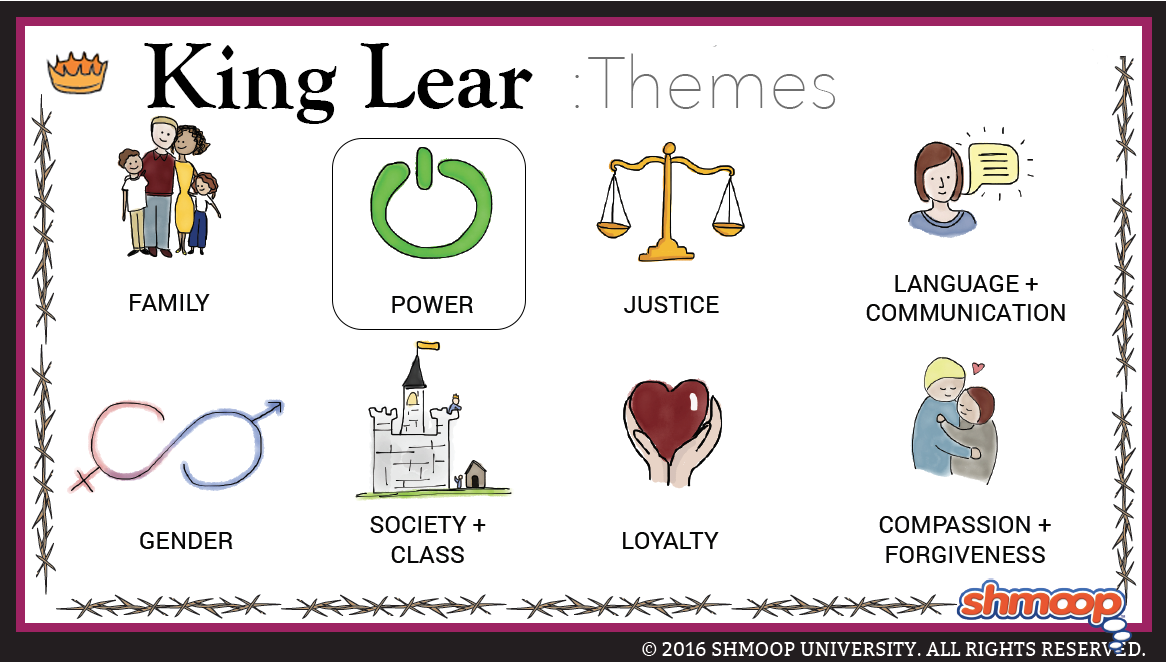
Um, more like loss of power. Poor Lear really loses it all: his family, his mind... and his power.
After retiring and divvying up his kingdom among his ungrateful daughters, Lear discovers what it's like to lose the power and authority that come with the responsibilities of active rule. In addition to being a monarch, King Lear is also a family patriarch and Shakespeare asks us to consider the similarities between a father's relationship with his children and a king's relationship with his subjects.
Questions About Power
- Why does Lear want to divvy up his kingdom among his children? What happens as a result?
- Does King Lear have any power or authority left when he gives up his crown?
- Discuss why King Lear keeps a retinue of a hundred rowdy knights? Why do you think Goneril and Regan object to this?
- Who is left to govern the kingdom at the end of the play? Does anybody want the job? Why or why not?
Chew on This
Although King Lear sets out to avoid family and political conflict, his decision to retire and divide his kingdom results in a major family conflict as well as a full-blown national crisis. Without the title of "king," Lear's authority means ultimately nothing—Shakespeare's play, then, suggests that a monarch's power is completely arbitrary.
Tired of ads?
Cite this source, logging out…, logging out....
You've been inactive for a while, logging you out in a few seconds...
W hy's T his F unny?

William Shakespeare
Ask litcharts ai: the answer to your questions.
At the beginning of the play, Lear is an authority figure, embodying order in his own person and commanding it from his family and followers. (This is how he is able to compel his elder two daughters to participate in the dramatic ceremony dividing the kingdom by professing their absolute love on cue, precisely when he demands it; this is why Gloucester, Kent, and others respectfully watch the ceremony unfold, despite thinking that Lear's plan to give up power is a bad idea.) Just as the father-child bonds discussed above encompass both a private and a public dimension, authority and order in this play exist at both the level of the family and the level of the nation.
Throughout the tragedy, Lear and other characters also repeatedly invoke the ideas of natural and divine order. Lear appeals to the idea of divine justice when his children treat him unjustly (e.g. after his final quarrel with Goneril and Regan: "O heavens,/ If you do love old men […] Send down and take my part" [2.4.218-221]). Gloucester similarly calls out to the gods after he has been betrayed and blinded in 3.7. Meanwhile, nature in the play seems to mirror the political chaos of the play, particularly in the form of the brutal storm that rages even as Lear himself, the former embodiment of order in the kingdom, rages in his own madness.
Authority and Order ThemeTracker
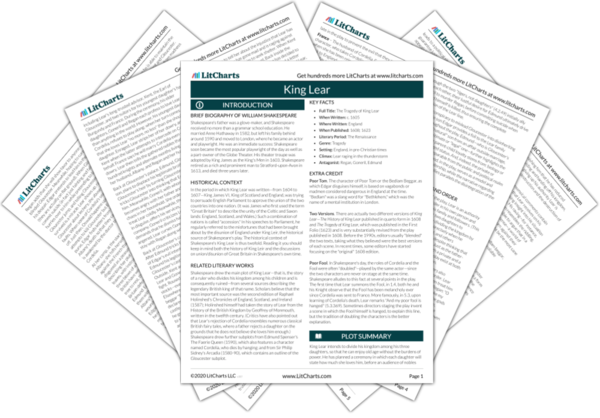
Authority and Order Quotes in King Lear

- English Literature
- Short Stories
- Literary Terms
- Web Stories
Discuss the theme of madness in William Shakespeare’s King Lear
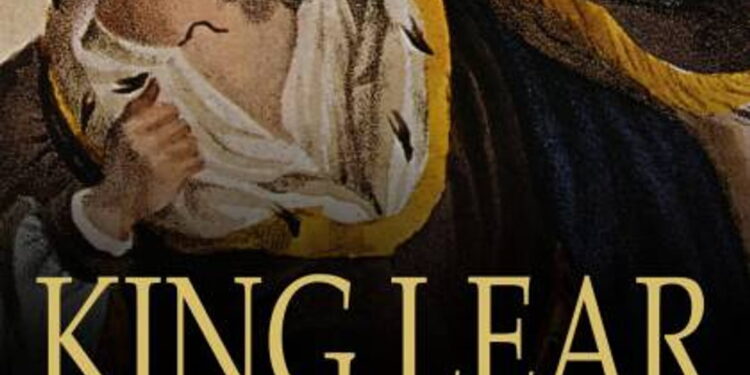
Table of Contents
The theme of madness is a central and compelling aspect of William Shakespeare’s tragedy “King Lear.” In this play, madness is explored through multiple characters, most notably King Lear himself.
Theme of madness in William Shakespeare’s King Lear:- The theme of madness serves as a reflection of the chaos and disintegration of both personal and societal order. This analysis will delve into the various manifestations of madness in “King Lear” and its significance in the overall narrative.
King Lear’s descent into madness is one of the most prominent and tragic portrayals of mental instability in all of Shakespeare’s works. The gradual unraveling of Lear’s sanity is triggered by his ill-fated decision to divide his kingdom among his three daughters based on their flattery.
Also Read:-
- Analyze the use of metaphor in William Butler Yeats Sailing to Byzantium
- How does Gabriel Garcia Marquez use the concept of solitude in Love in the Time of Cholera
- Discuss the theme of the American Dream in John Steinbeck’s Of Mice and Men
- Analyze the use of symbolism in D.H. Lawrence’s The Rocking-Horse Winner
Theme of madness in William Shakespeare’s King Lear:- As he realizes the depth of his mistake and experiences the betrayal of his daughters, Lear’s mind becomes fragmented, and he loses touch with reality.
Lear’s madness is marked by moments of profound lucidity interspersed with episodes of delusion and erratic behavior. In his madness, Lear retreats to the stormy heath, stripping himself of his noble identity and embracing the chaos of nature. His dialogue becomes disjointed and filled with nonsensical ramblings, reflecting the disarray of his mind.
Theme of madness in William Shakespeare’s King Lear:- Through Lear’s madness, Shakespeare explores the fragility of human reason and the devastating consequences of unchecked pride and flawed judgment.
In addition to Lear, other characters in the play exhibit signs of madness, further emphasizing the pervasive nature of this theme. The Fool, a companion and voice of reason to Lear, uses his witty and cryptic language to express truths that others fail to comprehend.
Theme of madness in William Shakespeare’s King Lear:- His role as a licensed fool allows him to criticize and expose the folly and madness of those in power. The Fool’s presence highlights the blurred line between sanity and madness and serves as a contrasting voice of reason in a world engulfed by chaos.
Also Read:- William Shakespeare Biography and Works
The character of Edgar also adopts a feigned madness as part of his disguise while on the run from his illegitimate brother, Edmund. Adopting the persona of Poor Tom, Edgar engages in bizarre and nonsensical behavior to protect himself. This simulated madness allows Edgar to navigate the treacherous world of the play and ultimately serve as a guide and support to his father, Gloucester.
Theme of madness in William Shakespeare’s King Lear:- Edgar’s feigned madness provides a parallel to Lear’s genuine descent into madness, further exploring the fragility of human sanity and the potential for deception.
The theme of madness in “King Lear” is deeply intertwined with the breakdown of societal order and the disruption of natural hierarchies. Lear’s madness mirrors the chaos that engulfs the kingdom as his decision to abdicate his power and divide his kingdom plunges the realm into turmoil. The disorder and madness that manifest within the characters reflect the unraveling of the social fabric and the moral decay of the world depicted in the play.
Furthermore, madness is used as a means of social commentary, critiquing the corrupting influence of power and the folly of unchecked ambition. Characters such as Edmund, Regan, and Goneril demonstrate their own form of madness as they pursue power at any cost, resorting to deceit, betrayal, and manipulation. Their actions reveal the destructive consequences of avarice and an insatiable thirst for control.
King Lear “Themes”
“King Lear” is one of William Shakespeare’s most renowned tragedies, believed to have been written between 1603 and 1606. The play delves into various profound themes that explore the complexities of human nature, society, and the consequences of actions. Here are some of the prominent themes in “King Lear”:
- Madness and Sanity: Madness is a pervasive theme throughout the play. It is depicted both through the character of King Lear himself, who descends into madness as a result of his ill-advised actions and mistreatment by his daughters, and through the Fool, whose seemingly nonsensical ramblings often contain profound truths. The theme of madness raises questions about the nature of sanity, the vulnerability of human reason, and the fragility of the human mind.
- Filial Ingratitude: “King Lear” explores the theme of ingratitude, particularly within the context of parent-child relationships. Lear’s two eldest daughters, Goneril and Regan, betray their father’s trust and display ingratitude for the love and care he has shown them. This theme highlights the breakdown of familial bonds, the corruption of power, and the moral decay that can arise from such ingratitude.
- Power and Authority: The play extensively examines the theme of power and authority and how it can corrupt individuals. Lear’s initial abdication of his power leads to chaos and the exploitation of his vulnerability by his daughters. The struggle for power and the abuse of authority are seen not only in the realm of monarchy but also within the familial and political spheres, revealing the destructive consequences of unchecked power.
- Justice and Injustice: The theme of justice is central to the play. Lear’s tragic journey forces him to confront the injustices of the world, both personal and societal. The play questions the nature of justice and explores the consequences when justice is perverted or denied. It also examines the idea of cosmic justice and the concept that wrongdoing will ultimately be punished.
- Nature and the Natural Order: The play explores the relationship between humanity and the natural world. The storm on the heath serves as a metaphor for the chaos and disorder unleashed when the natural order is disrupted. The theme of nature emphasizes the moral order and harmony that can be found in the natural world and highlights the consequences of defying or disregarding it.
Theme of madness in William Shakespeare’s King Lear:- These themes collectively contribute to the complexity and depth of “King Lear” as a tragedy, unraveling the consequences of human actions, the fragility of relationships, and the complexities of power and justice.
The theme of madness in William Shakespeare’s “King Lear” is a powerful and intricate exploration of the human psyche, the breakdown of order, and the consequences of flawed judgment. Lear’s descent into madness, marked by moments of lucidity and delusion, showcases the devastating effects of pride and flawed decision-making.
Theme of madness in William Shakespeare’s King Lear:- The presence of the Fool as a voice of reason and Edgar’s feigned madness further highlight the blurred lines between sanity and insanity. The theme of madness also serves as a reflection of the societal chaos and moral decay within the play, illustrating the destructive consequences of unchecked ambition and the corruption of power.
Theme of madness in William Shakespeare’s King Lear:- Through the exploration of madness, Shakespeare provides profound social commentary on the fragility of reason and the consequences of disrupting natural hierarchies. “King Lear” remains a timeless tragedy that invites readers to contemplate the complexities of the human mind and the tumultuous nature of the human condition.
Q: What is the main theme of “King Lear”?
A: The main themes of “King Lear” include the nature of power, the consequences of flawed judgment, the breakdown of familial and societal order, and the fragility of human sanity.
Q: How does madness play a role in “King Lear”?
A: Madness is a significant theme in “King Lear.” It is primarily explored through the character of King Lear himself, whose descent into madness reflects the chaos and disintegration of personal and societal order. Other characters, such as the Fool and Edgar, also exhibit madness, either genuine or feigned, adding layers of complexity to the theme.
Q: What triggers King Lear’s descent into madness?
A: King Lear’s descent into madness is triggered by his decision to divide his kingdom among his daughters based on their flattery rather than genuine love. When he realizes the betrayal of his two eldest daughters and the loss of his power and identity, Lear’s mind begins to unravel.
Q: How does Shakespeare portray madness in the play?
A: Shakespeare portrays madness through the use of language, behavior, and imagery. Lear’s dialogue becomes fragmented and filled with nonsensical ramblings, while his actions and interactions with others display erratic and unpredictable behavior. The feigned madness of characters like Edgar and the witty cryptic language of the Fool also contribute to the exploration of madness in the play.
Q: What is the relationship between madness and societal order in “King Lear”?
A: The theme of madness in “King Lear” is closely tied to the breakdown of societal order. Lear’s descent into madness mirrors the chaos and turmoil that engulfs the kingdom after he divides his power. The disruption of natural hierarchies and the corrupting influence of power are depicted through the madness of various characters, reflecting the decay of the social fabric.
Related Posts

The 48 Laws of Power Summary Chapterwise by Robert Greene
What is precisionism in literature, what is the samuel johnson prize.

Attempt a critical appreciation of The Triumph of Life by P.B. Shelley.

Consider The Garden by Andrew Marvell as a didactic poem.

Why does Plato want the artists to be kept away from the ideal state

MEG 05 LITERARY CRITICISM & THEORY Solved Assignment 2023-24

William Shakespeare Biography and Works

Discuss the theme of freedom in Frederick Douglass’ Narrative of the Life of Frederick Douglass

How does William Shakespeare use the concept of power in Richard III

Analyze the use of imagery in William Shakespeare’s sonnets

What is literature according to Terry Eagleton?
- Advertisement
- Privacy & Policy
- Other Links
© 2023 Literopedia
Welcome Back!
Login to your account below
Remember Me
Retrieve your password
Please enter your username or email address to reset your password.
Are you sure want to unlock this post?
Are you sure want to cancel subscription.

COMMENTS
Power and Betrayal in "King Lear" Shakespeare's "King Lear" is a renowned play in English literature, known for its complex characters and profound themes. Understanding the themes explored in the play is crucial to unraveling its depth and messages. One of the central themes in "King Lear" is power and authority.
Justice. King Lear is a brutal play, filled with human cruelty and awful, seemingly meaningless disasters. The play's succession of terrible events raises an obvious question for the characters—namely, whether there is any possibility of justice in the world, or whether the world is fundamentally indifferent or even hostile to humankind.
From Acts 1 to 4, King Lear slowly removes his clothes, beginning with his crown. To describe giving up his role as king, Lear uses the word "divest," which comes from the Old French desvestir, meaning "to undress.". When he faces the storm in Act 3, he shouts, "Off, off, you lendings.". The word "lendings" to refer to his ...
Fathers, Children, and Siblings. The personal drama of King Lear revolves around the destruction of family relationships. Tragedy emerges from bonds broken between parents and children—and, at a secondary level, from the loss of ties among siblings. Lear, misreading Cordelia's understated, but true, devotion to him renounces his "parental ...
Theme #1. Age. Age and the process of aging is a significant theme of the play, King Lear. When a person starts aging, he starts losing his significance. As King Lear starts aging, he starts making decisions about his kingdom and makes a bet on the persons expressing their profound love for them. However, old King Lear does not understand ...
Each character in King Lear serves as a vehicle for exploring themes of power, betrayal, redemption, and the human condition, providing insights into Shakespeare's views on the complexities of family dynamics and societal structures.. Themes and Symbols. King Lear is rich with themes and symbols that resonate through its tragic narrative, deeply exploring the human condition, the dynamics of ...
Act 2: The Unraveling of Betrayal. In Act 2 of King Lear By William Shakespeare, Goneril and Regan's betrayal of Lear indicates the corrupting have an effect on of strength and the erosion of familial bonds. Their mistreatment in their father reflect a starvation for manage, symbolizing the risks of unchecked ambition.
Set in ancient Britain, the play tells the story of King Lear, who, in a moment of tragic folly, decides to divide his kingdom among his three daughters based on their expressions of love for him. The consequences of this ill-fated decision lead to betrayal, madness, and ultimate tragedy. Lear's descent into madness and the parallel narrative ...
Expert Answers. Loyalty and betrayal in King Lear are tied to the theme of appearance and reality. In family matters, those who appear the most loyal are the most disloyal, while those who appear ...
The main themes in King Lear are loyalty, madness, and power. Loyalty: While some of the play's characters embody evil and cruelty, others demonstrate great loyalty and selflessness. Kent and ...
Betrayal overall in the play shows how quickly power can be gained and just how quickly it can be lost as well. The first major betrayal in the play that causes an outcome of loss of power is the betrayal of King Lear toward his daughter Cordelia. When Lear states "Here I disclaim all my paternal care" the tragedy of the play begins to ...
Themes. in. King Lear. Man's Law vs. Nature's Law: One of the central conflicts of Shakespeare's King Lear is family relationships and how they are complicated by misunderstandings or conflicting social and political aims. Over and over, clashes between natural and human-made law recur, often over the subject of inheritance.
The themes of power and madness in "King Lear" serve as a stark reminder of the fragility of human reason and social order when faced with ambition and deceit. Family Ties and the Quest for Justice in King Lear. In "King Lear," the bonds of family are tested and torn asunder, revealing the complexities of loyalty and betrayal.
The lunatics of King Lear—pretended and actual—are forever in closer contact with reality than the seemingly sane.This is evident in the Fool, whose job is to veil the harsh truth in the garb of nonsense riddles and bawdy songs.The same is true of Edgar, who capers naked in his shocking disguise as Poor Tom, and Lear himself. The play's madmen, either implicitly or explicitly, reveal one ...
King Lear: Themes. Justice: This theme explores the imbalance of fairness in the kingdom and the moral rightness of the characters' actions; it questions whether justice exists in the universe. ... emphasising themes of loyalty, betrayal, and power struggles. Gender: This theme criticises patriarchal rule by exploring the destructive power ...
Natural vs. Culture: Family Roles. This is an important theme in the play, as it brings about much of its action from the very first scene and connects to other central themes like language versus action, legitimacy, and perception. Edmund, for example, asserts that his status as illegitimate son is only a product of unnatural social constructs ...
Betrayal and Loyalty - the importance of trust in King Lear. Betrayal and loyalty are closely related themes in King Lear. The play explores the consequences of betrayal and the importance of loyalty. The betrayal of Lear by his daughters is a central plot point in the play, setting in motion the tragic events that follow.
King Lear Betrayal Quotes. Let it be so. Thy truth, then, be thy dower, For by the sacred radiance of the sun, The mysteries of Hecate and the night, By all the operation of the orbs. From whom we do exist, and cease to be, Here I disclaim all my paternal care, Propinquity, and property of blood,
The personal drama of King Lear revolves around the destruction of family relationships. Tragedy emerges from bonds broken between parents and children—and, at a secondary level, from the loss of ties among siblings. Lear, misreading Cordelia's understated, but true, devotion to him renounces his "parental care" (1.1.127) of her.
Poor Lear really loses it all: his family, his mind... and his power. After retiring and divvying up his kingdom among his ungrateful daughters, Lear discovers what it's like to lose the power and authority that come with the responsibilities of active rule. In addition to being a monarch, King Lear is also a family patriarch and Shakespeare ...
Themes and Colors. LitCharts assigns a color and icon to each theme in King Lear, which you can use to track the themes throughout the work. At the beginning of the play, Lear is an authority figure, embodying order in his own person and commanding it from his family and followers. (This is how he is able to compel his elder two daughters to ...
Discuss the theme of loyalty in William Shakespeare's King Lear. Loyalty is a central theme in William Shakespeare's tragic play, "King Lear." Set against a backdrop of political intrigue, familial turmoil, and betrayal, the play delves deep into the complexities of loyalty and examines how it shapes the relationships between charParters.
The theme of madness in William Shakespeare's "King Lear" is a powerful and intricate exploration of the human psyche, the breakdown of order, and the consequences of flawed judgment. Lear's descent into madness, marked by moments of lucidity and delusion, showcases the devastating effects of pride and flawed decision-making.